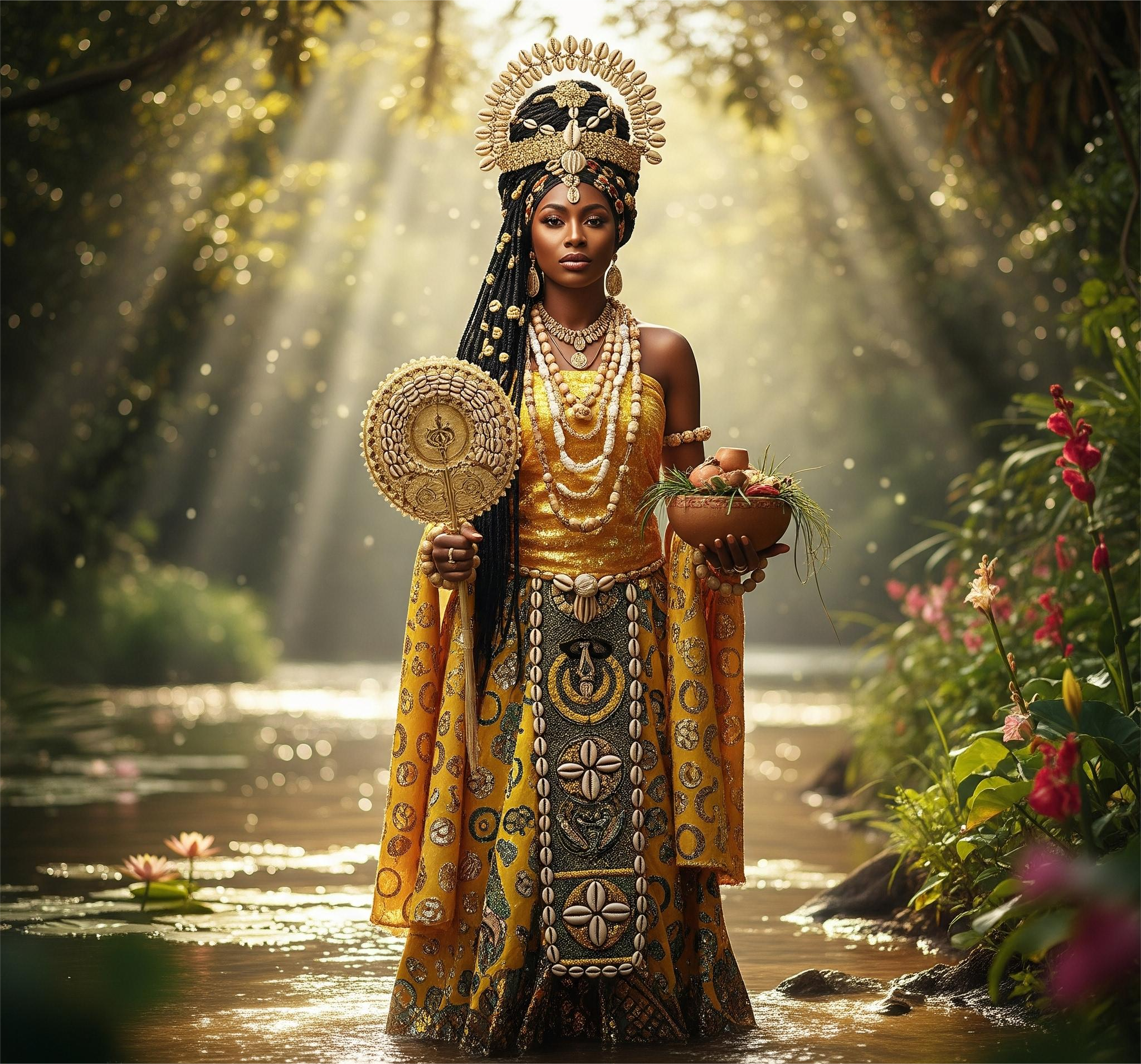In the lush spiritual traditions of the Yoruba people of West Africa, Osun (also spelled Oshun or Osún) reigns as one of the most beloved and powerful Orishas—divine spirits that embody aspects of nature and human experience. Revered as the goddess of fresh water, fertility, beauty, and love, Osun’s influence flows far beyond the rivers she is said to inhabit, touching the hearts of devotees across continents and centuries.
The Divine Waters of Life: Osun’s Domain
Osun is deeply associated with freshwater rivers and streams, particularly the Osun River in Nigeria, where her sacred grove remains a major pilgrimage site. Water, in Yoruba cosmology, is more than just a resource—it is a spiritual essence, a life force. As such, Osun’s presence in rivers symbolizes:
Purity and healing: Her waters are believed to cleanse spiritual and physical ailments.
Fertility and birth: Osun is often invoked by women seeking children or safe childbirth.
Flow of love and emotion: Just like a river flows gently or turbulently, Osun governs the complexities of love, sensuality, and feminine power.
Osun’s Role in Yoruba Religion
As one of the seven major Orishas, Osun holds a central place in Ifá, the Yoruba system of divination and worship. She is the only female Orisha among the original 17 sent to Earth by the supreme god Olodumare, and her presence was essential for the success of creation.
Her spiritual roles include:
Messenger between worlds: Osun often acts as a mediator between humans and the divine.
Protector of women and children: She is seen as a nurturing mother figure, but one who demands respect.
Force of justice: Osun is sweet, but when disrespected, she can withhold blessings or bring chaos, making her a symbol of both love and righteous vengeance.
Osun’s Symbols and Rituals
Devotees of Osun honor her through rituals, dance, music, and offerings. Some key aspects of her worship include:
Colors: Gold, yellow, and white represent her purity and beauty.
Offerings: Honey, oranges, cinnamon, and river water are common gifts.
Symbols: The mirror, fan, and rivershell are sacred to her, reflecting vanity, grace, and fluidity.
Animals: Peacocks and freshwater fish are associated with her elegance and realm.
Every year, thousands attend the Osun-Osogbo Festival at her sacred grove in Nigeria—an event blending ritual, celebration, and cultural preservation that has been recognized by UNESCO.
Osun Across the Atlantic: Diaspora and Syncretism
Through the transatlantic slave trade, Yoruba spirituality traveled to the Americas, where Osun’s worship evolved and merged with other traditions.
In Cuba, she is known as Oshún, and in Santería, she is syncretized with Our Lady of Charity, a Catholic Marian figure.
In Brazil, she is worshiped in Candomblé and Umbanda, where she remains associated with love, wealth, and beauty.
Across the Caribbean and Latin America, Osun is invoked in matters of the heart, healing, and prosperity.
This fusion of African and New World belief systems highlights Osun’s resilience and enduring spiritual power, even in the face of colonial oppression and cultural erasure.
Feminine Power, Resistance, and Rebirth
Osun is more than a river goddess—she is a symbol of feminine strength, sensuality, and sacred knowledge. She teaches that softness does not mean weakness and that beauty and power can coexist. In African and Diasporic communities today, Osun continues to inspire:
Feminist spiritual movements
Art and poetry
Healing practices centered on ancestral wisdom
From the rippling waters of the Osun River to altars in Harlem, Havana, and Salvador, Osun remains a living spirit, reminding the world of the sacredness of water, love, and womanhood.







